"Cherishing Little Steps - A Haven for Baby and Family Journeys"
Homemade Baby Food Recipes: Healthy and Easy Options
When it comes to nourishing your little one, homemade baby food can be a game-changer. Imagine the satisfaction of knowing exactly what goes into your baby's meals, ensuring they get the best start in life. From simple first foods to creative combinations of nutritious ingredients, the possibilities are endless. So, why not explore the world of homemade baby food recipes, where healthy and easy options await to tantalize your baby's taste buds and support their growth and development?
Key Takeaways
- Blend a variety of fruits and vegetables for nutrient-rich purees.
- Introduce protein sources like lean meats, legumes, and yogurt.
- Incorporate superfoods like avocado, sweet potatoes, and quinoa for added nutrients.
- Plan batch cooking sessions for convenient and healthy baby meals.
- Monitor allergies by introducing new foods one at a time.
Nutritious First Foods for Babies
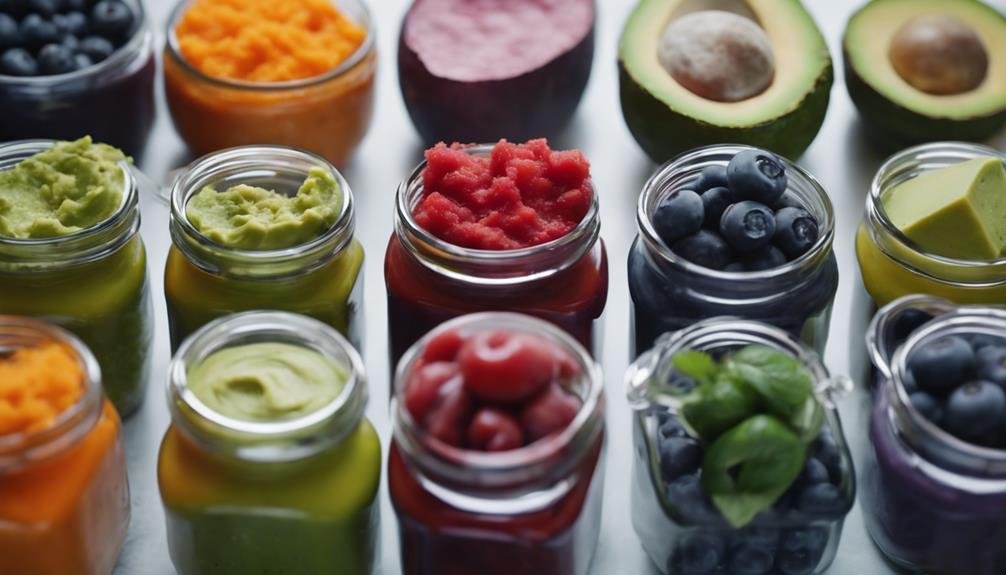
When introducing nutritious first foods to babies, it's important to start with simple and easily digestible options. Breast milk or formula remains the primary source of nutrition for infants up to six months old. However, around the six-month mark, your baby may be ready to start exploring solid foods.
It is recommended to begin with single-ingredient purees such as mashed bananas, avocados, or sweet potatoes. These foods are gentle on your baby's stomach and are less likely to cause digestive issues. Introducing new foods one at a time can help you identify any potential allergies or sensitivities your baby may have.
Remember to offer a variety of fruits, vegetables, and grains to ensure your baby receives a wide range of nutrients. As your baby grows, you can gradually start incorporating more complex flavors and textures into their diet. Always consult with your pediatrician before introducing any new foods to your baby's diet to ensure they're meeting their nutritional needs.
Easy-to-Make Vegetable Purees
After introducing nutritious first foods to your baby, consider incorporating easy-to-make vegetable purees into their diet to provide a variety of essential nutrients. Vegetables are packed with vitamins, minerals, and fiber crucial for your baby's growth and development.
To make a simple vegetable puree, start by steaming or boiling vegetables like sweet potatoes, carrots, peas, or butternut squash until they're soft. Then, blend them in a food processor or blender until smooth. You can also add a little breast milk, formula, or water to adjust the consistency to your baby's liking.
Introducing a variety of vegetables early on can help develop your baby's palate for healthy foods later in life. Some popular vegetable combinations include sweet potato and peas, carrot and apple, or butternut squash and broccoli. Remember to introduce one new vegetable at a time and watch for any signs of allergies.
Homemade vegetable purees are a nutritious and cost-effective way to provide your baby with the essential nutrients they need for healthy growth.
Fruit Mash-Up Recipes
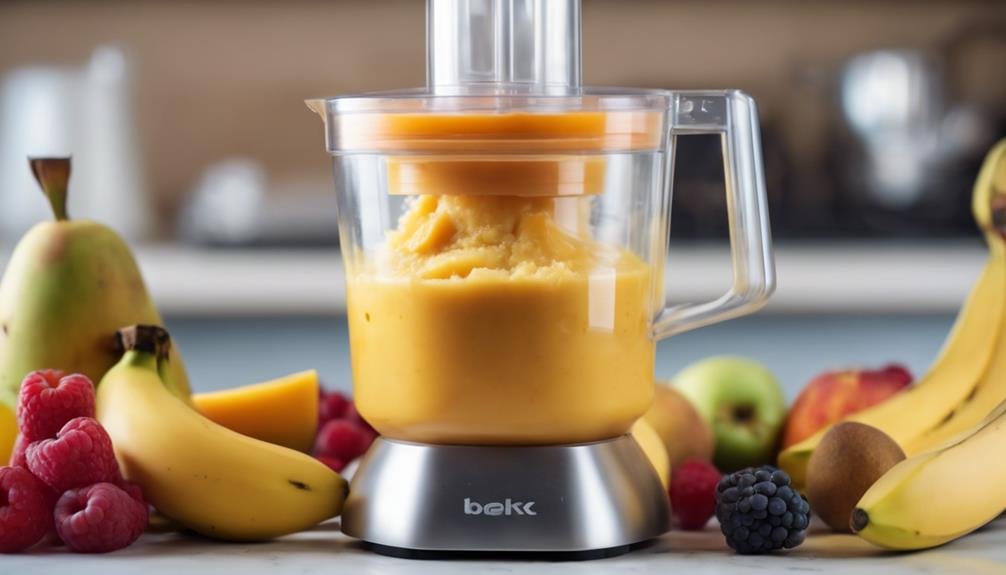
Consider blending a variety of fresh fruits to create delicious and nutritious fruit mash-ups for your baby's diet. Fruits are packed with essential vitamins, minerals, and fiber that are beneficial for your baby's growth and development. Combining different fruits not only introduces a range of flavors but also provides a diverse array of nutrients.
One simple and tasty fruit mash-up recipe is a blend of ripe bananas, juicy peaches, and sweet strawberries. These fruits offer a mix of potassium, vitamin C, and antioxidants, making it a healthy choice for your little one. Another delightful combination could include creamy avocado, which is rich in healthy fats, along with pear and mango for a tropical twist.
Experiment with various fruits to discover your baby's favorites. Remember to wash and peel the fruits, removing any seeds or pits before blending them into a smooth puree. Introduce one fruit at a time to monitor for any potential allergies. These homemade fruit mash-ups are a great way to provide your baby with wholesome and tasty meals.
Protein-Packed Baby Food Ideas
Enhance your baby's diet with protein-packed meal ideas that support their growth and development. Introducing protein-rich foods into your baby's diet is essential for their overall health and well-being. Opt for soft-cooked and pureed lean meats such as chicken, turkey, or beef to provide a good source of high-quality protein. Another great option is incorporating strained plain yogurt, which not only offers protein but also contains beneficial probiotics for gut health.
Legumes like lentils, chickpeas, and black beans are fantastic plant-based protein sources that can be mashed or pureed for easy consumption. These legumes are also packed with fiber, iron, and other essential nutrients. Additionally, consider offering small amounts of finely chopped tofu or scrambled eggs to boost your baby's protein intake.
Remember to introduce one new protein at a time to watch for any potential allergic reactions. By including these protein-packed foods in your baby's meals, you can help support their growth, development, and overall nutritional needs.
Superfoods for Tiny Tummies
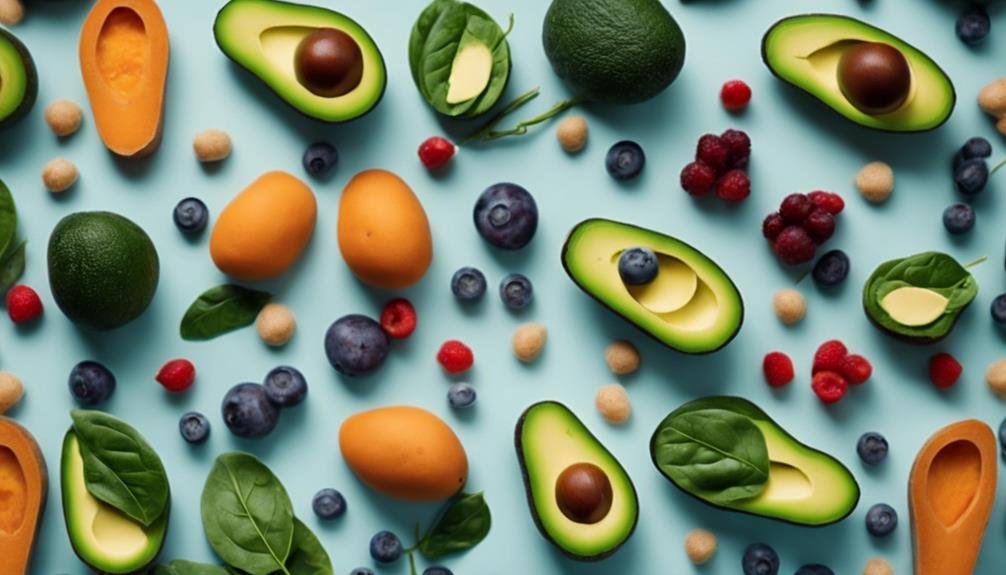
Wondering which superfoods are ideal for your little one's tiny tummy to support their growth and development? Introducing nutrient-dense options that can help your baby thrive:
- Avocado: Packed with healthy fats for brain development and creamy texture that's easy for tiny tummies to digest.
- Sweet Potatoes: Rich in beta-carotene, a precursor to vitamin A, essential for vision and immune function.
- Blueberries: Loaded with antioxidants that support your baby's overall health and development.
- Quinoa: A complete protein source that provides essential amino acids for growth and energy.
Incorporating these superfoods into your baby's diet can introduce a wide range of essential nutrients crucial for their development. Remember to introduce new foods one at a time and watch for any signs of allergies or sensitivities. By offering a variety of superfoods, you're providing your little one with a strong nutritional foundation for a healthy start in life.
Allergy-Friendly Baby Food Options
For parents navigating potential food allergies in their baby's diet, exploring allergy-friendly baby food options is essential to ensure safe and nutritious meals for your little one. It's crucial to identify common allergens like dairy, eggs, nuts, wheat, and soy, and introduce new foods gradually to monitor any adverse reactions. Opt for single-ingredient purees such as apples, pears, or sweet potatoes to pinpoint any sensitivities your baby may have.
Consider incorporating hypoallergenic options like quinoa, millet, or butternut squash into your baby's diet. These alternatives provide essential nutrients without the risk of triggering allergies. Homemade baby food allows you to have full control over the ingredients, ensuring a safe and tailored approach to your baby's unique dietary needs.
Always consult with your pediatrician before introducing new foods, especially if your baby is at a higher risk of allergies. By being proactive and informed, you can create a varied and allergy-friendly meal plan that supports your baby's health and development.
Homemade Snack Ideas for Little Ones
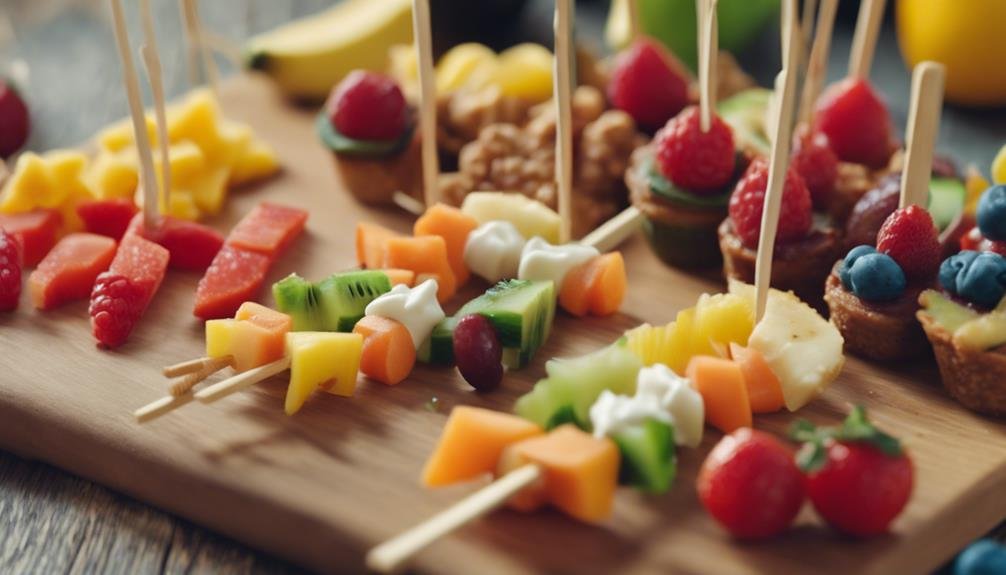
Exploring nutritious and easy-to-make homemade snack ideas for your little ones can contribute to their balanced diet and overall well-being. Providing wholesome snacks not only helps in keeping your child full between meals but also ensures they're getting the essential nutrients for their growth and development. Here are some delightful homemade snack ideas for your little munchkins:
- Fruit Kebabs: Encourage your child to eat a variety of fruits by threading them onto skewers for a fun and colorful snack.
- Yogurt Parfait: Layer Greek yogurt with granola and fresh berries for a tasty and protein-packed treat.
- Veggie Quesadillas: Sneak in some veggies by making mini quesadillas with whole wheat tortillas, cheese, and finely chopped vegetables.
- Apple Sandwiches: Create mini sandwiches using apple slices as the 'bread' and nut or seed butter as the filling for a crunchy and satisfying snack.
These snack ideas aren't only simple to prepare but also offer a healthy alternative to store-bought snacks, promoting good eating habits from a young age.
Quick and Healthy Baby Meals
To ensure your little one receives nutritious meals that are quick to prepare, consider incorporating a variety of wholesome ingredients into their diet for optimal growth and development.
Quick and healthy baby meals can be easily achieved by combining nutrient-dense foods that offer essential vitamins and minerals. Try mixing mashed avocado with cooked quinoa for a creamy and protein-packed meal. Another option is steaming sweet potatoes and blending them with a splash of breast milk or formula for a smooth and satisfying puree.
For a balanced meal, mix pureed fruits like apples or pears with yogurt to provide a good source of calcium and probiotics. Additionally, scrambled eggs with finely chopped spinach can offer a quick and nourishing option rich in iron and other important nutrients.
Batch Cooking for Busy Parents
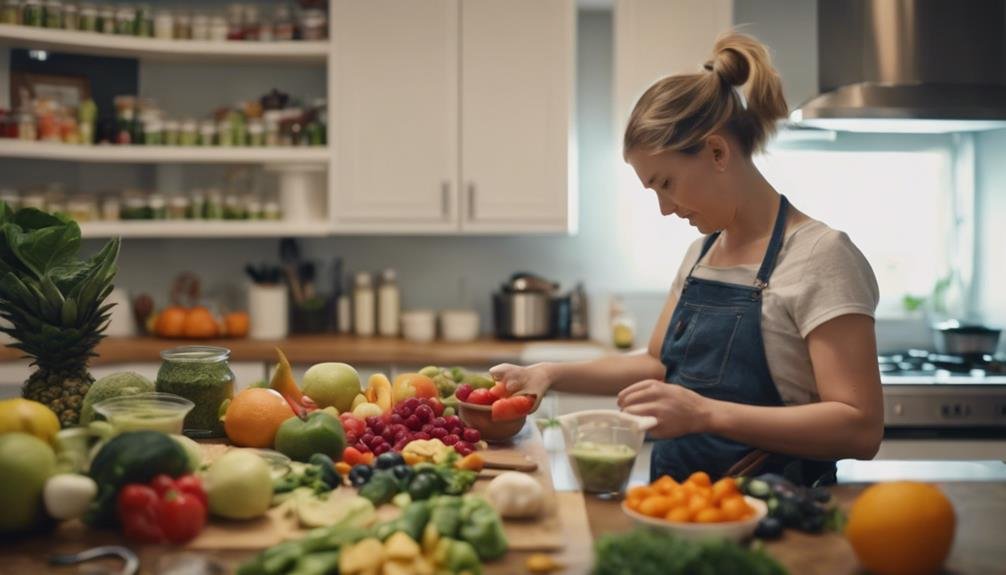
Batch cooking can be a lifesaver for busy parents looking to streamline meal preparation and ensure their family eats well despite hectic schedules. By dedicating a few hours on a weekend or a free evening to cook in bulk, you can save time during the week and still provide nutritious meals for your little one.
Here are some tips to make batch cooking a successful and enjoyable experience for you:
- Plan Ahead: Take some time to plan your meals for the week, including baby food options. Having a meal plan will help streamline your cooking process and ensure you have all the necessary ingredients on hand.
- Invest in Storage Containers: Make sure you have a variety of storage containers in different sizes to store your batch-cooked meals. This will help keep your food fresh and organized throughout the week.
- Label and Date: Remember to label and date your containers before storing them in the fridge or freezer. This will help you keep track of when the food was prepared and ensure you use it before it spoils.
- Get the Family Involved: Batch cooking can be a fun family activity. Get your partner or older children involved in the process to make it a bonding experience while also lightening your workload.
Frequently Asked Questions
Can I Use Frozen Fruits and Vegetables for Homemade Baby Food?
Yes, you can use frozen fruits and vegetables for homemade baby food. Freezing preserves nutrients well. Thaw them before preparing the food. Ensure they are plain with no added sugars or salt. Always check for any signs of spoilage before feeding your baby.
How Can I Introduce Spices and Herbs to My Baby's Diet?
When introducing spices and herbs to your baby's diet, start with milder options like cinnamon or ginger. Offering a variety of flavors early can help develop their palate. Remember, always consult with your pediatrician before making any dietary changes.
Are There Any Tips for Dealing With a Picky Eater?
When dealing with a picky eater, offer a variety of nutritious foods, involve your child in meal prep, and be patient. Create a positive mealtime environment and avoid pressuring them to eat. Encourage trying new foods without forcing.
Can I Use Breastmilk or Formula in Baby Food Recipes?
You can absolutely incorporate breastmilk or formula into baby food recipes. It adds essential nutrients and familiar flavors for your little one. Remember: "Don't cry over spilled milk." Enjoy experimenting with different combinations to see what your baby loves.
What Are Some Creative Ways to Serve Baby Food to My Little One?
Serve baby food creatively by mixing purees into yogurt, oatmeal, or smoothies. Try making mini fruit and veggie muffins or freezing purees into fun shapes. Use silicone molds for easy portioning. Encourage exploration and healthy eating habits.
Conclusion
In conclusion, homemade baby food offers a nutritious and easy way to provide your little one with essential nutrients for healthy growth. Remember, variety is key to ensure your baby receives a well-rounded diet.
So get creative in the kitchen and try out different recipes to keep mealtime exciting for your baby. As they say, the world is your oyster when it comes to feeding your precious bundle of joy.


